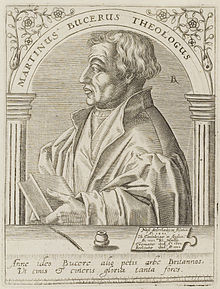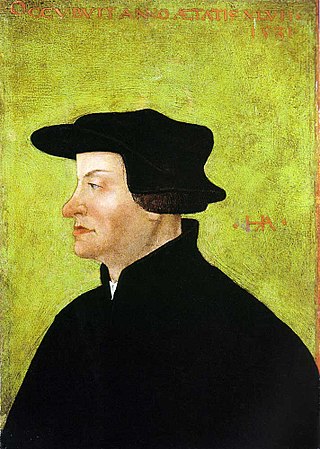
Huldrych or Ulrich Zwingli was a leader of the Reformation in Switzerland, born during a time of emerging Swiss patriotism and increasing criticism of the Swiss mercenary system. He attended the University of Vienna and the University of Basel, a scholarly center of Renaissance humanism. He continued his studies while he served as a pastor in Glarus and later in Einsiedeln, where he was influenced by the writings of Erasmus.

Transubstantiation is, according to the teaching of the Catholic Church, "the change of the whole substance of bread into the substance of the Body of Christ and of the whole substance of wine into the substance of the Blood of Christ". This change is brought about in the eucharistic prayer through the efficacy of the word of Christ and by the action of the Holy Spirit. However, "the outward characteristics of bread and wine, that is the 'eucharistic species', remain unaltered". In this teaching, the notions of "substance" and "transubstantiation" are not linked with any particular theory of metaphysics.
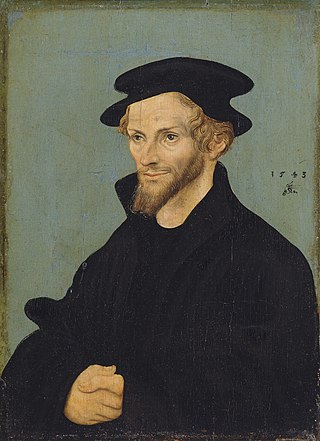
Philip Melanchthon was a German Lutheran reformer, collaborator with Martin Luther, the first systematic theologian of the Protestant Reformation, an intellectual leader of the Lutheran Reformation, and influential designer of educational systems.
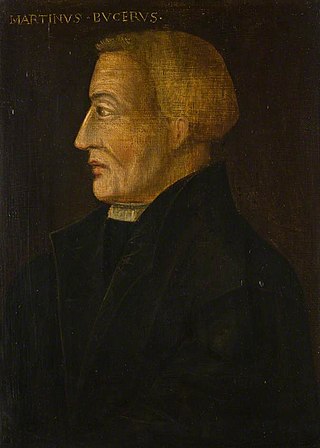
Martin Bucer was a German Protestant reformer based in Strasbourg who influenced Lutheran, Calvinist, and Anglican doctrines and practices. Bucer was originally a member of the Dominican Order, but after meeting and being influenced by Martin Luther in 1518 he arranged for his monastic vows to be annulled. He then began to work for the Reformation, with the support of Franz von Sickingen.

Johannes Oecolampadius was a German Protestant reformer in the Calvinist tradition from the Electoral Palatinate. He was the leader of the Protestant faction in the Baden Disputation of 1526, and he was one of the founders of Protestant theology, engaging in disputes with Erasmus, Huldrych Zwingli, Martin Luther and Martin Bucer. Calvin adopted his view on the Eucharist dispute.
Crypto-Calvinism is a pejorative term describing a segment of those members of the Lutheran Church in Germany who were accused of secretly subscribing to Calvinist doctrine of the Eucharist in the decades immediately after the death of Martin Luther in 1546. It denotes what was seen as a hidden Calvinist belief, i.e., the doctrines of John Calvin, by members of the Lutheran Church. The term crypto-Calvinist in Lutheranism was preceded by terms Zwinglian and Sacramentarian. Also, Jansenism has been accused of crypto-Calvinism by Roman Catholics.

The real presence of Christ in the Eucharist is the Christian doctrine that Jesus Christ is present in the Eucharist, not merely symbolically or metaphorically, but in a true, real and substantial way.
The means of grace in Christian theology are those things through which God gives grace. Just what this grace entails is interpreted in various ways: generally speaking, some see it as God blessing humankind so as to sustain and empower the Christian life; others see it as forgiveness, life, and salvation.

Leo Jud, known to his contemporaries as Meister Leu, was a Swiss reformer who worked with Huldrych Zwingli in Zürich.

The Marburg Colloquy was a meeting at Marburg Castle, Marburg, Hesse, Germany, which attempted to solve a disputation between Martin Luther and Ulrich Zwingli over the Real Presence of Christ in the Eucharist. It took place between 1 October and 4 October 1529. The leading Protestant reformers of the time attended at the behest of Philip I of Hessen. Philip's primary motivation for this conference was political; he wished to unite the Protestant states in political alliance, and to this end, religious harmony was an important consideration.

Eucharistic theology is a branch of Christian theology which treats doctrines concerning the Holy Eucharist, also commonly known as the Lord's Supper. It exists exclusively in Christianity and related religions, as others generally do not contain a Eucharistic ceremony.

The Sacramentarians were Christians during the Protestant Reformation who denied not only the Roman Catholic transubstantiation but also the Lutheran sacramental union.
The Tetrapolitan Confession, also called the Strasbourg Confession or Swabian Confession, was an early Protestant confession of faith drawn up by Martin Bucer and Wolfgang Capito and presented to the Emperor Charles V at the Diet of Augsburg on 9 July 1530 on behalf of the four south German cities of Konstanz, Lindau, Memmingen and Strasbourg. The confession was based on an early draft of the Augsburg Confession to which Bucer and Capito had secretly obtained access, but amended in the direction of Zwinglianism. Its purpose was to prevent a schism within Protestantism. It is the oldest confession of the Reformed tradition produced in Germany.
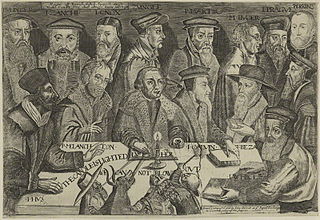
Calvinism originated with the Reformation in Switzerland when Huldrych Zwingli began preaching what would become the first form of the Reformed doctrine in Zürich in 1519.

The theology of Ulrich Zwingli was based on an interpretation of the Bible, taking scripture as the inspired word of God and placing its authority higher than what he saw as human sources such as the ecumenical councils and the church fathers. He also recognised the human element within the inspiration, noting the differences in the canonical gospels. Zwinglianism is the Reformed confession based on the Second Helvetic Confession promulgated by Zwingli's successor Heinrich Bullinger in the 1560s.
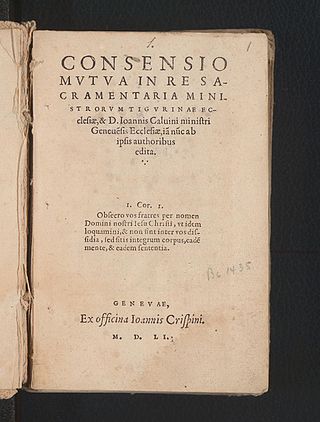
The Consensus Tigurinus or Consensus of Zurich was a Protestant document written in 1549 by John Calvin and Heinrich Bullinger.

A sacrament is a Christian rite that is recognized as being particularly important and significant. There are various views on the existence, number and meaning of such rites. Many Christians consider the sacraments to be a visible symbol of the reality of God, as well as a channel for God's grace. Many denominations, including the Catholic, Lutheran, Anglican, Methodist, and Reformed, hold to the definition of sacrament formulated by Augustine of Hippo: an outward sign of an inward grace, that has been instituted by Jesus Christ. Sacraments signify God's grace in a way that is outwardly observable to the participant.
Reformed worship is religious devotion to God as conducted by Reformed or Calvinistic Christians, including Presbyterians. Despite considerable local and national variation, public worship in most Reformed and Presbyterian churches is governed by the Regulative principle of worship.

In Reformed theology, baptism is a sacrament signifying the baptized person's union with Christ, or becoming part of Christ and being treated as if they had done everything Christ had. Sacraments, along with preaching of God's word, are means of grace through which God offers Christ to his elect. Sacraments are believed to have their effect through the Holy Spirit, but these effects are only believed to accrue to those who have been predestined to have faith in Christ.
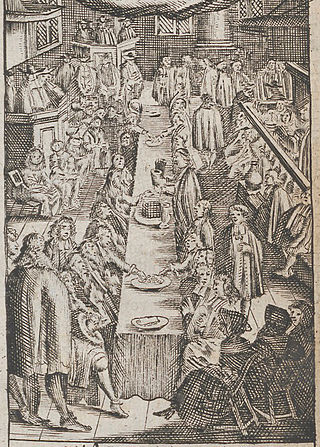
In Reformed theology, the Lord's Supper or Eucharist is a sacrament that spiritually nourishes Christians and strengthens their union with Christ. The outward or physical action of the sacrament is eating bread and drinking wine. Reformed confessions, which are official statements of the beliefs of Reformed churches, teach that Christ's body and blood are really present in the sacrament, and that believers receive, in the words of the Belgic Confession, "the proper and natural body and the proper blood of Christ." The primary difference between the Reformed doctrine and that of Catholic and Lutheran Christians is that for the Reformed, this presence is believed to be communicated in a spiritual manner rather than by his body being physically eaten. The Reformed doctrine of real presence is called "pneumatic presence".



